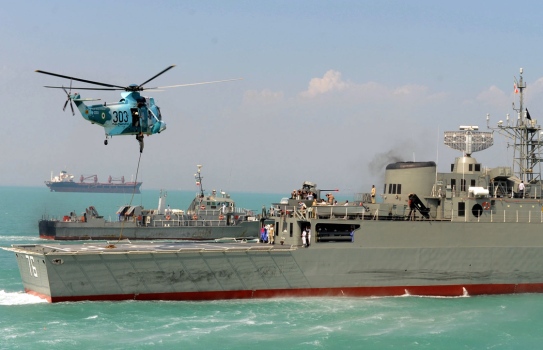Iran building new naval base near Pakistan's border

By Sara Rajabova
Iran is setting up a new naval base near Pakistan's border, according to a senior military official.
Navy Commander Rear Admiral Habibollah Sayyari said the country is establishing the new base in the port city Pasabandar in the Sea of Oman to boost Iran's defense capabilities, Press TV reported.
"The naval base, which is under construction, is situated in the Gwadar Gulf on our country's farthest eastern shores bordering Pakistan," Sayyari said on Sunday.
Sayyari added that the new base will be part of the Navy's third naval zone in Konarak.
He said that the Navy has intensified its efforts to develop the Makran coast, which stretches from Iran's port city of Bandar Abbas to Makran (also known as Pasabandar).
"The Iranian navy has so far had no military presence in the area, but now, we will be present in the region to defend the interests and maritime resources of our country and exercise a tighter control over the traffic in the region," Sayyari noted.
Iran's Navy has been seeking to increase its naval presence in international waters.
The new base will be located 30 km to the west of Pakistan's Gwadar and it will also make possible Iran's military involvement outside the Persian Gulf. The Iranian army plans to send its warships to the Atlantic Ocean and the Mediterranean Sea in the future.
Besides, Sayyari said a fleet of Iranian warships will be docking at the Strait of Malacca and China in the near future.
In line with guidelines from the Leader of the Islamic Revolution Ayatollah Ali Khamenei to sail international waters and assert Iran's maritime authority, Iranian naval forces have been sent to the high seas, the Navy commander said.
He added that the presence of Iranian warships in international waters does not pose a threat to other countries, stressing that based on international law Tehran has the right to sail the high seas.
Sayyari stated that Iran's oil tankers and merchant vessels -- which used to fall prey to pirates in the Gulf of Aden and the Bab el-Mandeb Strait in the past -- can now safely cruise in high seas, thanks to the protection of Iranian naval forces.
Sayyari said the Iranian Navy plans to station warships in the Strait of Malacca -- a narrow 805-kilometer (500-mile) stretch of water between the Malay Peninsula and the Indonesian island of Sumatra - in the near future.
The Navy commander concluded that Iranian ships have been conducting anti-piracy missions in the northern Indian Ocean over the past three years, and have docked at ports in Saudi Arabia, Sudan and Djibouti.
Iranian warships will soon dock in Chinese ports, Sayyari added.
Iran's Defense Minister Ahmad Vahidi said that Iran will unveil Jamaran 2 Warship and a modern technology seaplane in the coming months.
Speaking to reporters on the sidelines of the National Conference on Developing Coastal Areas of Makran and Marine Authority, Vahidi also said that coastal areas of Makran are very important and this matter has gained much attention with naval forces' presence there.
"The government has seriously planned to develop these coastal areas," the minister added, stressing Makran's strategic role in transit routes.
"A working group on Cabinet level, headed by Deputy President, has been established to develop Makran coastal areas, and a general scheme of establishing an organization for developing Makran coastal areas has been worked out, as specific authority for the development," Vahidi explained.
Iran's Navy has also conducted several military maneuvers in order to display the country's capabilities in defending its maritime borders.
In January, Iranian naval forces wrapped up six-day naval drills in and around the country's southern waters, stretching from the Strait of Hormuz to the north of the Indian Ocean.
During these military exercises the Iranian Navy test-fired the Qader (Capable) surface-to-sea, Nour (Light) surface-to-surface missiles, the latest version of the indigenous surface-to-air missile Ra'd (Thunder) and launched the indigenous short-range cruise missile Nasr (Victory).
Over the past few years, Iran has held several military drills to enhance the defense capabilities of its armed forces and to test modern military tactics and equipment.
Iran has repeatedly assured other nations, especially its neighbors, that its military might poses no threat to other countries, insisting that its defense doctrine is based on deterrence.
Here we are to serve you with news right now. It does not cost much, but worth your attention.
Choose to support open, independent, quality journalism and subscribe on a monthly basis.
By subscribing to our online newspaper, you can have full digital access to all news, analysis, and much more.
You can also follow AzerNEWS on Twitter @AzerNewsAz or Facebook @AzerNewsNewspaper
Thank you!
